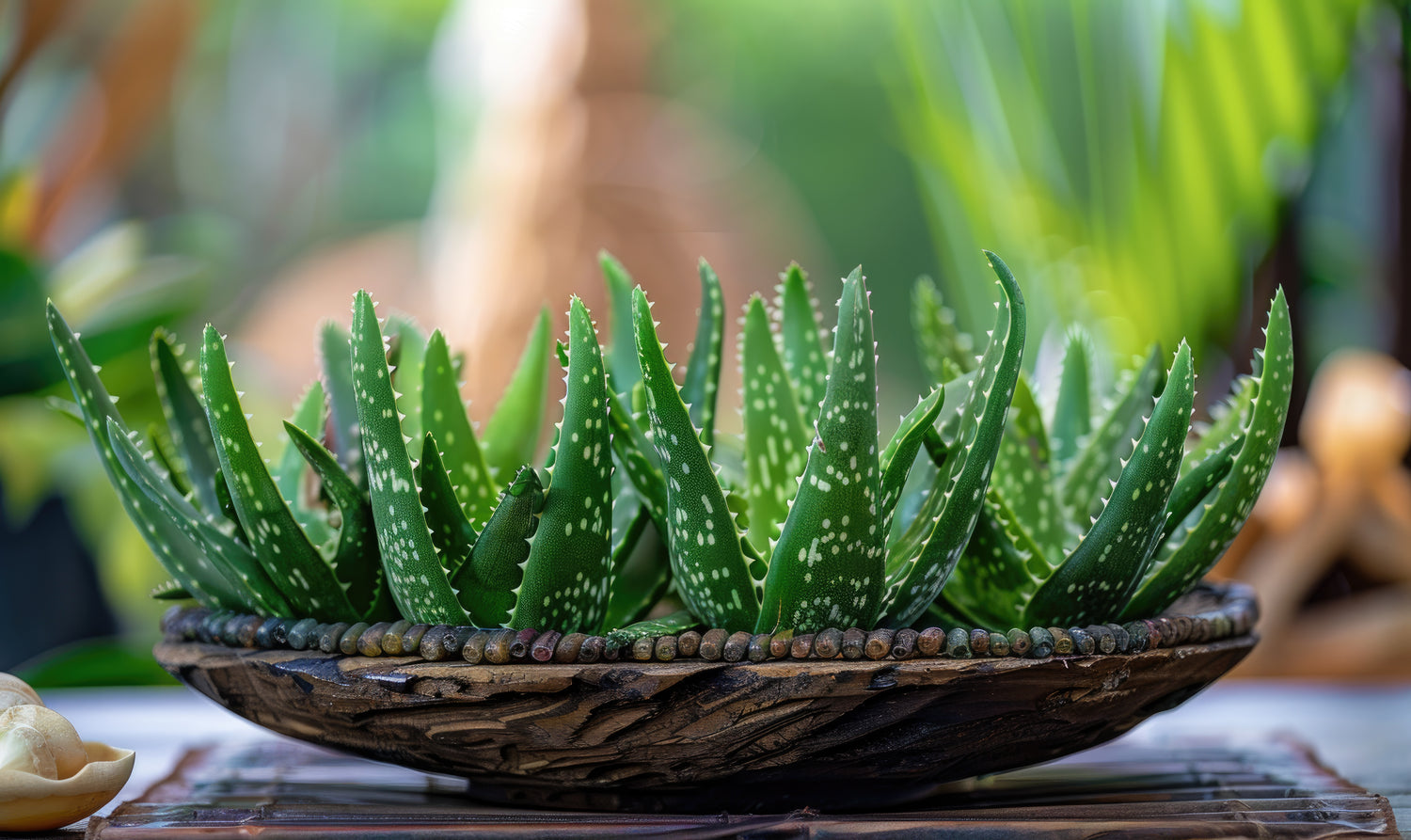Maintaining a healthy digestive system is crucial for overall well-being. Digestive issues like bloating, indigestion, and irregular bowel movements can disrupt daily life and impact your health. One natural remedy that has gained popularity for its digestive benefits is Aloe Vera. Known for its soothing properties, Aloe Vera can aid digestion and relieve bloating effectively. This article explores how Aloe Vera supports digestive health and provides tips on incorporating it into your daily routine.
What is Aloe Vera?

Aloe Vera is a succulent plant species belonging to the genus Aloe. It has been used for centuries in traditional medicine for its healing and therapeutic properties. The plant's thick, fleshy leaves contain a gel-like substance rich in vitamins, minerals, enzymes, and amino acids, making it a versatile natural remedy for various health issues, including digestive problems.
Also Read- Using Mulch To Protect Aloe Vera In Winter
How Aloe Vera Aids in Digestion
Aloe Vera promotes digestive health through several mechanisms:
1. Soothes the Digestive Tract
Aloe Vera has anti-inflammatory properties that help soothe the lining of the digestive tract. This can reduce irritation and discomfort caused by conditions like acid reflux, gastritis, and irritable bowel syndrome (IBS).
2. Improves Gut Health
The enzymes present in Aloe Vera aid in the breakdown of proteins, fats, and carbohydrates, enhancing nutrient absorption and digestion. Additionally, Aloe Vera acts as a prebiotic, supporting the growth of beneficial gut bacteria, which are essential for a healthy digestive system.
3. Regulates Bowel Movements
Aloe Vera possesses natural laxative properties that help regulate bowel movements. It can alleviate constipation by softening stool and promoting regularity without causing harsh side effects associated with synthetic laxatives.
4. Detoxifies the Body
Aloe Vera helps flush out toxins from the digestive system, promoting a cleaner and more efficient digestive process. This detoxification supports overall health and prevents the buildup of harmful substances in the gut.
5. Enhances Digestive Enzyme Production
Aloe Vera stimulates the production of digestive enzymes in the body, which play a crucial role in breaking down food more effectively. Enhanced enzyme activity can lead to better digestion and reduced instances of bloating and gas.
Also Read- Aloe Vera And Weight Management: Helping Older Adults Maintain A Healthy Weight
How Aloe Vera Relieves Bloating

Bloating is a common digestive issue characterized by a feeling of fullness and swelling in the abdomen. Aloe Vera can help relieve bloating through the following ways:
1. Reduces Gas Formation
By improving the digestion of food, Aloe Vera minimizes the production of gas in the digestive tract. Efficient digestion prevents the fermentation of undigested food by gut bacteria, which is a primary cause of bloating.
2. Balances pH Levels
Aloe Vera helps maintain a balanced pH level in the stomach, which is essential for proper digestion. An optimal pH level prevents the overproduction of stomach acid, reducing the likelihood of bloating and discomfort.
3. Promotes Smooth Muscle Relaxation
The anti-inflammatory compounds in Aloe Vera can relax the smooth muscles of the intestines, easing the passage of gas and reducing bloating.
4. Supports Hydration
Adequate hydration is vital for preventing bloating, and Aloe Vera gel contains a high water content. Consuming Aloe Vera helps keep the digestive system hydrated, facilitating smoother digestion and reducing bloating.
Also Read- Using Aloe Vera To Treat Kids’ Minor Burns And Scrapes
How to Use Aloe Vera for Digestive Health

Incorporating Aloe Vera into your diet can be simple and enjoyable. Here are some effective ways to consume Aloe Vera for digestive benefits:
1. Aloe Vera Juice
One of the most popular ways to consume Aloe Vera is in juice form. Look for pure Aloe Vera juice without added sugars or artificial ingredients. Drink a small glass (about 2-4 ounces) daily on an empty stomach for best results. To enhance the taste, you can mix Aloe Vera juice with a bit of lemon or honey.
2. Smoothies
Add Aloe Vera gel to your favorite smoothies for a nutritious boost. Blend it with fruits, vegetables, and a liquid base like water or almond milk to create a delicious and health-enhancing drink.
3. Capsules and Supplements
If you prefer not to consume Aloe Vera directly, consider taking Aloe Vera capsules or supplements. These are available in health stores and online, providing a convenient way to incorporate Aloe Vera into your routine.
4. Aloe Vera Gel
Use Aloe Vera gel as a topping for yogurt, oatmeal, or desserts. Its mild taste blends well with various foods, allowing you to enjoy its digestive benefits without altering the flavor of your meals.
5. Homemade Aloe Vera Tea
Prepare Aloe Vera tea by steeping Aloe Vera leaves in hot water. Let it cool before drinking. This soothing beverage can help ease digestive discomfort and promote overall digestive health.
Also Read- Aloe Vera Uses In Hair Care: Strengthen, Hydrate, And Promote Growth
Precautions and Considerations

While Aloe Vera is generally safe for most people, it's essential to take some precautions:
- Quality Matters: Choose high-quality Aloe Vera products from reputable brands to ensure purity and effectiveness.
- Dosage: Start with a small amount to see how your body reacts. Excessive consumption can lead to diarrhea or stomach cramps.
- Allergies: Some individuals may be allergic to Aloe Vera. Perform a patch test before using it topically and consult a healthcare professional before ingesting it.
- Medical Conditions: If you have existing medical conditions or are taking medications, consult your doctor before adding Aloe Vera to your diet.
- Pregnancy and Breastfeeding: Pregnant or breastfeeding women should seek medical advice before consuming Aloe Vera, as it may have effects on hormone levels and uterine contractions.
Scientific Evidence Supporting Aloe Vera's Digestive Benefits
Numerous studies have validated the digestive benefits of Aloe Vera. Research published in the Journal of Ethnopharmacology found that Aloe Vera gel can significantly reduce inflammation in the digestive tract, aiding in the management of conditions like IBS and Crohn's disease. Another study in Phytotherapy Research demonstrated that Aloe Vera juice improves digestion by enhancing enzyme activity and promoting the growth of beneficial gut bacteria. These scientific findings support the traditional use of Aloe Vera as a natural remedy for various digestive issues.
Conclusion
Aloe Vera is a powerful natural remedy that can significantly enhance digestive health by aiding digestion and relieving bloating. Its anti-inflammatory, soothing, and detoxifying properties make it an excellent addition to your daily wellness routine. Whether consumed as juice, added to smoothies, or taken as supplements, Aloe Vera offers versatile ways to support your digestive system naturally.
Incorporating Aloe Vera into your diet not only promotes better digestion but also contributes to overall health and well-being. By choosing high-quality Aloe Vera products and following proper usage guidelines, you can enjoy the full spectrum of its digestive benefits safely and effectively.













Leave a comment
This site is protected by hCaptcha and the hCaptcha Privacy Policy and Terms of Service apply.